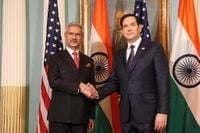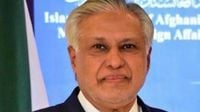In a significant escalation of military tensions between India and Pakistan, the G7 nations have issued a strong condemnation of a terrorist attack that occurred on April 22 in Pahalgam, Indian Kashmir, which resulted in the deaths of 26 civilians. In a joint statement released on May 10, 2025, the foreign ministers of Canada, France, Germany, Italy, Japan, the United Kingdom, the United States, and the European Union urged both nations to exercise maximum restraint and called for immediate de-escalation.
The G7 statement read, "We, the G7 Foreign Ministers of Canada, France, Germany, Italy, Japan, the United Kingdom, and the United States of America and the High Representative of the European Union, strongly condemn the egregious terrorist attack in Pahalgam on April 22 and urge maximum restraint from both India and Pakistan. Further military escalation poses a serious threat to regional stability. We are deeply concerned for the safety of civilians on both sides." They encouraged both countries to engage in direct dialogue towards a peaceful outcome.
Since the attack, hostilities between India and Pakistan have intensified. Reports indicate that India has been conducting precision airstrikes targeting militant bases in Pakistan, claiming these actions are in retaliation for the Pahalgam attack. On May 7, India launched strikes that reportedly targeted several key military installations across the border.
In response, Pakistan has vowed to retaliate and has claimed that its airbases were targeted by Indian missiles and drones. The situation has led to daily clashes, with both countries trading fire along their borders. Pakistan's Foreign Minister Ishaq Dar stated that his country would consider de-escalation if India halted its attacks, while also warning that any further strikes would elicit a response from Islamabad.
U.S. Secretary of State Marco Rubio has been actively involved in diplomatic efforts to mitigate the conflict. In a call with Indian External Affairs Minister Subrahmanyam Jaishankar, Rubio emphasized the importance of restoring direct lines of communication to avoid miscalculations that could lead to further escalation. He also reached out to Pakistan's army chief, Asim Munir, offering U.S. assistance in facilitating discussions aimed at de-escalating tensions.
Rubio's diplomatic overtures come as the U.S. administration, under President Trump, expresses concern over the long-standing conflict between India and Pakistan. White House Press Secretary Karoline Leavitt noted that the President is keen to see a swift resolution to the tensions and has good relationships with the leaders of both nations.
As the situation evolves, the Indian armed forces have launched Operation Sindoor, a military initiative aimed at striking terror camps deep within Pakistan and Pakistan-occupied Kashmir. Wing Commander Vyomika Singh stated that these airstrikes are conducted with precision to minimize collateral damage while targeting critical military infrastructure.
Despite the ongoing military actions, the Pakistani government has indicated a desire for dialogue. Sources suggest that communication channels have been established to arrange a meeting between representatives from both countries, signaling a potential shift in Pakistan's approach amid the heightened tensions.
However, the atmosphere remains fraught with danger. Reports indicate that Pakistani ground forces have been mobilizing towards forward positions, suggesting an intent to escalate the situation further. Indian officials have reiterated their commitment to non-escalation, provided that Pakistan reciprocates.
On the ground, the human cost of this conflict continues to rise. The recent military exchanges have led to civilian casualties, including the death of a senior official in Jammu and Kashmir due to cross-border shelling. Both nations remain on high alert, with their armed forces prepared for any further escalation.
As the international community watches closely, the G7's call for restraint and dialogue reflects a growing concern over the potential for a larger conflict in the region. The situation remains fluid, with both sides trading accusations and military strikes, making the prospect of peace seem increasingly distant.
In summary, the escalating tensions between India and Pakistan following the Pahalgam attack have drawn international condemnation and calls for dialogue. The G7's strong stance highlights the urgent need for both nations to engage in constructive discussions to prevent further escalation and ensure the safety of civilians on both sides.






